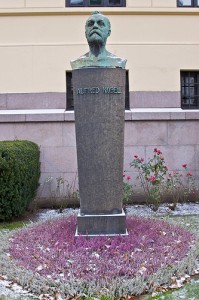
Photo by Ragnar Singsaas
What if this year’s Nobel Peace Prize committee members worked in our organizations?
Our work worlds would be paradise—well, at least we wouldn’t be wondering what fresh hell or other rabbit hole we had fallen into.
In this fantasy world, recognition would be regular—or at least once a year for major acknowledgements. We’d also appreciate people for their potential, their hopes, and their inspiration.
Even more basic, we’d remember to recognize people in a timely fashion instead of routinely forgetting to thank them. The belatedly—and sometimes begrudgingly—thanks for prior year’s accomplishments would be an outdated artifact.
We’d have a culture of appreciation, which would make our work environment more enjoyable, enriching and motivating.
I can dream, can’t I? This vision came to me after two dramatically different events happened within days of each other.
First was the awarding of this year’s Nobel Peace Prize to U.S. President Barack Obama, which caught everyone by surprise. Rosabeth Moss Kanter, the Harvard Business School professor, told her blog readers that “prizes are now increasingly popular as incentives for innovation and change instead of rewards for what is already established.”
She wrote that we should interpret this year’s Nobel Prize as a sign that the “Nobel Committee wants to influence U.S. politics by giving Obama a booster rocket” that she “presumes they hope will help get his agenda enacted.”
Second was my participation in IABC’s Pacific Plains Regional 2009 Exchange Conference, which featured the session The Carrot Principle: Recognition Changes Everything. Chris Kendrick of the O.C. Tanner Company, gave a high energy talk about the black hole of workplace recognition.
“Recognition is America’s most underused motivational tool,” he explained while throwing carrots and other rewards to audience members who correctly answered his quiz questions. Research has shown the tight link between appreciation and engagement and how recognition drives results.
Yet recognition is sadly lacking in organizations worldwide, especially in terms of frequency. For example, 88% of workers cite lack of acknowledgement as their top work issue. Gallup’s research has shown that people in high-performance cultures—regardless of what motivates them— want some form of recognition or praise once every seven days.
Recognition feels good to the recipient and the receiver. And especially in these tough turbulent times, why can’t we remember to take a few moments to recognize people? For basically little time and no money, we can get huge benefits and relieve some of the crabbiness in the workplace. (See “Crank Out the Crabbiness” in July’s The LEAN Communicator.) And furthermore, why can’t we appreciate both past actions and potential behavior?
In other words, in addition to paying it forward, recognize it forward!
Be a visionary leader/manager/colleague and look around the corner to catch someone about to do something right. Then call them on it—showing your sincere appreciation.
The workplace—and the world—will be a better place.

Liz you hit it on the spot — everyday recognition is one of THE most effective ways to drive performance and workplace satisfaction, and also one of the least expensive. It’s a downright bargain (low cost or even FREE) compared to the cost of replacing a high value employee, having a prize drawing, or providing a monetary bonus. In companies where I’ve worked, surveys tell us that workers would much rather have sincere and regular recognition of a job well done, from their peers and manager, over annual cash incentives or prizes. This is an amazing statistic when you think about all the budgetary challenges we face in our organizations.
Your idea about recognizing people prior to completion of a task is an interesting one. If someone is taking on an initiative that’s outside the scope of their role, and the initiative is aligned to a team goal or company value set, why not? As long as this is done following the same rules (sincere recognition provided to a person exhibiting above-and-beyond effort, for the better of the team or the organization) I think it adds an interesting twist to the concept of recognition for a job well done.
I agree that recognition is one of the most underutilized management tools today. To be clear, it should be non-monetary recognition. In some organizations formal recognition works really well, but I still prefer the information “hey, great job” in front a peers kind of recognition.
I wrote a bit about it on this post: http://jamieflinchbaugh.com/2009/10/innovation-and-rewarding-learning/